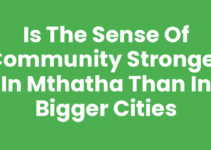Mthatha’s Central Business District (CBD) is a bustling hub of activity, drawing in locals and tourists alike. However, like many urban areas, it encounters challenges such as homelessness and begging, raising questions about the best ways to provide assistance while ensuring safety for everyone involved. This blog post aims to explore the best methods to handle beggars in Mthatha’s CBD, focusing on compassion, community action, and effective communication.
What Is The Best Way To Handle Beggars In Mthatha’s Cbd: A Step-by-Step Guide
Understanding how to deal with beggars in Mthatha’s CBD requires a balanced approach rooted in empathy and pragmatism. Here’s a step-by-step guide that outlines the best practices:
- Assess the Situation: Before engaging with any individual, take a moment to observe the area. Are there many individuals panhandling? Is there a pattern or reason for their presence in this particular part of the CBD? Knowing the context helps inform your response.
- Evaluate Your Feelings: Understand your motivations and emotions towards beggars. It’s important to approach the situation with compassion rather than judgment.
- Engage Responsively: If you feel safe, consider engaging the person politely. A simple conversation can make a significant difference. Ask open-ended questions about their needs or if they would prefer food or specific services rather than cash.
- Provide Resources: Inform them of available resources such as shelters, food banks, and social services in Mthatha. Distributing pamphlets or cards with local resource information can aid them tremendously.
- Consider Donations Wisely: Instead of giving cash, consider donating to reputable charities or organizations that support people in need. This ensures that your contributions are used to provide sustainable assistance.
- Advocate for Local Solutions: Participate in or support local initiatives aimed at addressing homelessness in Mthatha. Engage with local government and NGOs working towards long-term solutions.
- Set Boundaries: It is also essential to set personal and community boundaries. If a situation feels unsafe, prioritize your safety and the safety of others and seek help from local authorities when necessary.
Using this structured approach, residents and visitors can navigate interactions with beggars in a way that respects their dignity while ensuring a stable and safe environment for everyone in Mthatha’s CBD.
See Also: What Is The History Of The Transkei, Mthatha: An Overview
Understanding the Causes of Begging in Urban Areas
To effectively handle the situation, it’s important to understand the underlying causes of begging. Several factors contribute to this pressing social issue:
- Poverty: Many individuals find themselves in desperate circumstances due to lack of employment and economic opportunities.
- Addiction: Substance abuse often plays a role, with many individuals seeking quick cash to feed their habits.
- Social Isolation: Some beggars may lack family support, making them more vulnerable in their plight.
- Mental Health Issues: A portion of the begging population may be struggling with untreated mental health conditions that impair their ability to seek help.
Understanding these factors allows for a more compassionate approach while engaging with individuals in need and addressing the systemic issues at play.
Recommended Reading: How Can I Deal With Noisy Neighbours In Mthatha: Effective Tips
The Role of Community Initiatives in Supporting Beggars
Local organizations and community initiatives play a vital role in supporting the homeless and beggars in Mthatha’s CBD. Here are a few ways they are making a difference:
- Outreach Programs: Many NGOs offer outreach programs that connect beggars with shelters, counseling, and job training.
- Awareness Campaigns: Community campaigns that educate the public about homelessness can reduce stigma and foster a collaborative support system.
- Volunteer Opportunities: Getting involved with local charities allows community members to contribute hands-on toward improving the lives of those in need, offering food, clothing, and companionship.
Community involvement not only benefits beggars but fosters a stronger, more empathetic society.
Check This: What Is The Dialect Of Xhosa Spoken In Mthatha?
Conclusion
Handling beggars in Mthatha’s CBD requires a blend of empathy, awareness, and action. By engaging with compassion and advocating for community initiatives, we can collectively make a positive impact on those in need. Remember that small gestures can lead to significant changes in the lives of others, and together we can create a welcoming atmosphere for all.
Frequently Asked Questions
What should I do if I feel uncomfortable around a beggar?
Prioritize your safety. It's okay to walk away and seek help from local authorities if you feel threatened.
Are there organizations in Mthatha that help the homeless?
Yes, various NGOs and community groups offer support services, including shelters and food banks.
Is giving money to beggars a good idea?
Consider donating to local charities instead, as this can provide more sustainable help than cash.









